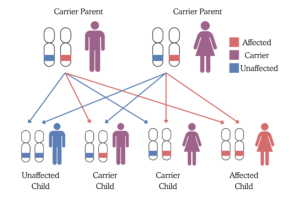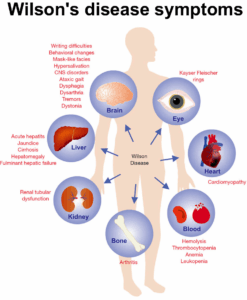Understanding Wilson Disease: A Genetic Perspective
Introduction:
Wilson Disease is a rare inherited disorder caused by mutations in the ATP7B gene, leading to abnormal copper metabolism and its accumulation in vital organs such as the liver, brain, and eyes. Early identification and management are crucial to prevent complications. Genetic counseling plays a pivotal role in navigating the complexities of this condition, offering guidance on testing, risk assessment, and family planning.
What is Wilson Disease?
Wilson Disease occurs due to mutations in the ATP7B gene, which encodes a protein essential for copper transport. This change results in excessive copper accumulation, causing tissue damage. As an autosomal recessive condition, individuals inherit one defective copy of the gene from each parent.
- Inheritance Pattern: Both parents are likely to be carriers for a child to inherit the disorder.
- Onset: Symptoms often emerge between 5 and 35 years of age, though early detection is possible through family screening.

Symptoms and Red Flags
Wilson Disease presents with diverse symptoms that may vary in severity. Key indicators include:
- Liver Symptoms: Jaundice, fatigue, abdominal swelling, or unexplained liver dysfunction.
- Neurological Symptoms: Tremors, clumsiness, difficulty speaking or swallowing, and changes in coordination.
- Behavioural Changes: Depression, mood swings, or cognitive decline.
- Eye Abnormalities: Kayser-Fleischer rings, a golden-brown ring in the cornea visible during a slit-lamp examination.
If these symptoms are observed, genetic counseling is essential to evaluate the need for diagnostic genetic testing.

Diagnosis of Wilson Disease
Diagnosing Wilson Disease involves multiple tests to confirm copper accumulation and identify the underlying genetic mutation. Key diagnostic approaches include:
- Kayser-Fleischer Rings
- These golden-brown rings, caused by copper deposits in the cornea,
are a hallmark of Wilson Disease. They are visible through a slit-lamp examination and are commonly present in individuals with neurological symptoms.
- These golden-brown rings, caused by copper deposits in the cornea,
- Urinary Copper Levels
- Elevated 24-hour urinary copper excretion (>100 µg/day) is a key biochemical marker for Wilson Disease, indicating impaired copper metabolism.
- Genetic Testing
- Detecting mutations in the ATP7B gene confirms the diagnosis and supports family screening.
- Helps differentiate Wilson Disease from other disorders with similar presentations.
- Carrier Testing:
- Particularly beneficial for family members of affected individuals to assess their risk of passing the condition to offspring.
- Useful in reproductive planning, enabling informed decisions.
- Pre-Symptomatic Testing: Identifies at-risk family members who may benefit from early monitoring and management.
Genetic testing is particularly valuable for individuals with atypical presentations or inconclusive biochemical findings.
- Leipzig Criteria
- This diagnostic scoring system integrates clinical features, biochemical markers, and genetic test results. Points are assigned for findings like Kayser-Fleischer rings, low serum ceruloplasmin levels, elevated urinary copper excretion, and the identification of ATP7B mutations. A score above a defined threshold confirms the diagnosis.
The Role of Genetic Counseling in Wilson Disease
Genetic counseling is indispensable for individuals and families affected by Wilson Disease. It provides:
- Risk Assessment: Evaluates inheritance patterns and recurrence risks for future generations.
- Testing Guidance: Explains the purpose, scope, and limitations of genetic tests, including pre-symptomatic and carrier testing.
- Support for Families:
- Assists in understanding the genetic basis and long-term implications of the disorder.
- Provides emotional support and strategies to cope with a diagnosis.
- Family Communication: Facilitates discussions with relatives to encourage at-risk members to undergo testing and, if necessary, seek early intervention.

For a detailed overview of the genetic counseling and testing process, refer to our previous blog (Understanding the Genetic Counseling Process: A Comprehensive Guide)
Why Genetic Counseling is Crucial
Wilson Disease has profound genetic and familial implications. Genetic counseling ensures:
- Timely Screening: For asymptomatic carriers or relatives of affected individuals, enabling early management.
- Informed Reproductive Decisions: Couples with a family history of Wilson Disease can explore reproductive options.
- Personalized Care: Tailored recommendations based on individual genetic risks and family history.
Conclusion
Wilson Disease, though rare, underscores the importance of genetic awareness and proactive care. Genetic counseling provides the essential knowledge and support families need to navigate through diagnosis, testing, and family planning effectively. At Mirror Gene, we are committed to helping families with accurate information and guidance. To learn more book an appointment today.

What you’ve written here speaks not just to the mind, but to the heart as well.
Good shout.